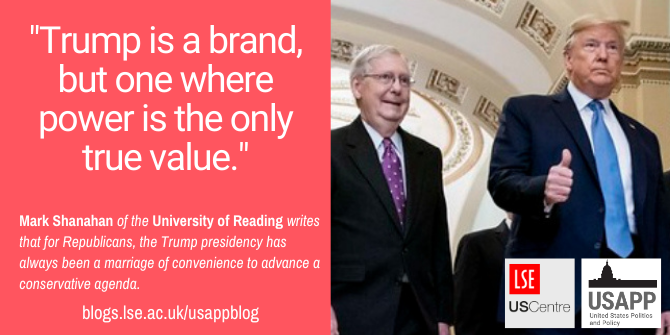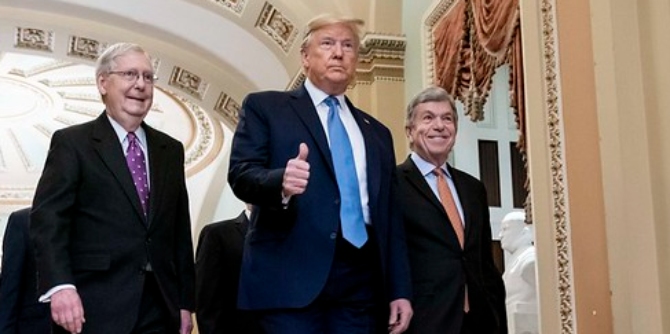 Why do many Republicans tolerate and even support Donald Trump when many of his past actions and current behaviors fly in the face of traditional conservatism? Mark Shanahan argues that the Republican Party and President Donald Trump are locked into a marriage of convenience, which sees Trump gain power, while the GOP is able to further embeds conservative culture into American life. The continuation of this relationship, he writes, is now reliant on the quick Senate confirmation of Supreme Court nominee Amy Coney Barrett.
Why do many Republicans tolerate and even support Donald Trump when many of his past actions and current behaviors fly in the face of traditional conservatism? Mark Shanahan argues that the Republican Party and President Donald Trump are locked into a marriage of convenience, which sees Trump gain power, while the GOP is able to further embeds conservative culture into American life. The continuation of this relationship, he writes, is now reliant on the quick Senate confirmation of Supreme Court nominee Amy Coney Barrett.
- This article is part of our Primary Primers series curated by Rob Ledger (Frankfurt Goethe University) and Peter Finn (Kingston University). Ahead of the 2020 election, this series explores key themes, ideas, concepts, procedures and events that shape, affect and define the US presidential primary process. If you are interested in contributing to the series contact Rob Ledger (ledger@em.uni-frankfurt.de) or Peter Finn (p.finn@kingston.ac.uk).
The goal for conservatives in the United States is a government that supports economically libertarian, socially conservative policy: one that removes the state from too much control, which then enables the flourishing of rugged individualism. Scratch beneath the surface and Donald J. Trump is hardly a rugged individualist in the mythology of the 19th century homesteader. But his presidency, a straightforward Republican playbook, has brought that vision far closer to conservative America. And while the candidate may fall far short of the pioneer ideal, he is, for Republican-leaning voters a means to an end whose time in the White House will embed conservative culture ever-deeper in the nation’s socio-political life.
Is this what drives Trump? Does it matter to him? I would suggest, no, not in the slightest, since he’s also playing the ‘means-to-an-end’ game. The end for him is the preservation of power, a power that’s very personal to him, gained and maintained with both little sense of morality, and an equal lack of vision for how that power is manifested.
Double Digit Trouble
Less than a month from voting day, Trump trails his Democrat rival Joe Biden by over eight points according to Real Clear Politics – some national polls put double digits between the candidates. Trump campaign staffers point to 2016 and continue to chime that the polls got it all wrong then. And that’s true up to a point. State by state, the polls were well off but, allowing for margin of error, the national polls were spot on. Move forward four years and Trump is at best evens, and at worst some way behind in the key swing states; his dire campaign performance to date has brought Red states from Arizona through Texas to the Carolinas into play, and as well as losing the presidency, there is a fair chance that his national leadership might lose the GOP the Senate as well.
Trump’s conservative base is still behind him. But it’s not enough to win a national election. The Democrats are now wise to the brilliant tactics of 2016 when the Trump campaign flooded the swing states of Pennsylvania, Michigan and Wisconsin in the final weeks of the campaign to edge narrow wins in the ‘winner-takes-all’ Electoral College stakes. Four years on, the element of surprise is lost. But so is any coherence of message or any excitement around the candidate.
Uneasy alliance
As part of teaching my American Government and Politics class, I interviewed an evangelical pastor last week in the wake of the car-crash first debate. He was unworried by Trump’s intemperate performance suggesting that at least he hadn’t allowed Biden to make any policy points, although he conceded that the president had turned the spectacle into a series of personal attacks. “Doesn’t that worry you?” I asked him. “Look, he responded. “When I go for surgery, I don’t care what the surgeon looks like or how they behave outside the operating theatre. I just want them to deliver on their promise of making me well. That’s how we feel about Trump. We don’t have to like him but trust him to deliver on his promises.” It’s a standard GOP trope, one that has been rolled out across Fox, not least by Trump standard bearer Laura Ingraham who said something very similar in the wake of the debate.
It’s a justification for the ‘grab em’ misogyny of 2016, and even Trump’s latest voyage into immorality – hosting events while Covid-positive, and putting his own security team at risk by parading in front of the Walter Reed Medical Center on Sunday in his hermetically-sealed (and therefore infection incubating) armoured SUV. If erudite, thoughtful voters such as my pastor are prepared to vote for Trump because he offers the best shot of delivering a conservative agenda in a conservative country, then he must still have a shot at victory. And victory gives him the power he craves: not necessarily power to do good, but power to be Trump for four more years.

“President Trump and Vice President Pence on Capitol Hill” by The White House is Public Domain.
The implosion fear
Trump is a brand, but one where power is the only true value. It’s a brand that looked likely to sustain to a second term early in 2020 as the economy stayed strong; as conservative promises (lower taxation, roll-back on regulation, conservative justices) were delivered and as the Democrats struggled to find a credible challenger. But it all went wrong with the pandemic; with the collapse and lack of a quick recovery of the economy and with a campaign that has been pedestrian at best.
While Joe Biden’s no FDR or JFK, all he’s had to do to keep ahead in the race is to keep his foot out of his mouth – and he’s largely achieved that. Trump has largely been denied his natural amphitheatre of the campaign rally; he’s failed to land many blows on his opponent – and he has singularly failed to find the right balance between fighting COVID-19 and supporting the economy. Layered over this are the highly partisan attacks from the House, and the tactical media stories such as the New York Times’ Trump tax story. He may have fought all of those of by adopting his usual stance: saying something outrageous and shifting the story. But then he got ill.
We are still absorbing the news of positive COVID-19 tests for the president, First Lady and a slew of senior Republicans off the back of an event to introduce his crowning achievement: a third conservative Supreme Court Justice. Ever the showman, he has tweeted, recorded videos and even took his ill-judged car ride (perhaps his smallest rally ever), while all the while the seriousness of his condition remains unclear. This could all go horribly wrong. At 74, overweight and on a fast-food diet, he could still become very ill, scuppering his chances of re-election. Or he could rally, claim to have defeated the virus (while ignoring 200,000+ US COVID-deaths) and get the bounce necessary for re-election. It matters little either way to the thoughtful base though. They see an ‘end’, a long-term legacy and rebalancing of power in the system towards conservatives. It has little to do with Trump. He’s played his part already. It’s down to the Senate now, to confirming Amy Coney Barrett as the replacement justice for Ruth Bader Ginsburg. That’s about speed. Confirm her before November 3 and Trump wins their vote. Fail to do that and perhaps they don’t vote in the droves Trump needs.
Ailing, or hail and hearty, the decision on who wins on November 3rd may already be out of Donald Trump’s hands.
Please read our comments policy before commenting.
Note: This article gives the views of the author, and not the position of USAPP – American Politics and Policy, nor the London School of Economics.
Shortened URL for this post: https://bit.ly/3nnqKKV
About the author
 Mark Shanahan – University of Reading
Mark Shanahan – University of Reading
Mark Shanahan is an Associate Professor and Head of Department for Politics & International Relations at the University of Reading.




